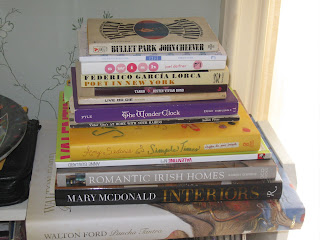The dreaded rejection. Does it ever end? Even published authors are not immune from rejection, I'm sorry to say. Being published does not guarantee that you are gold. Short stories in magazines, other novels in other genres...there's a long list of ways to be rejected. I thought I'd share a few of my collection over the years. Some of you may know that I started off writing historical fiction and really couldn't get my foot in the door. But the kind of historicals I liked to write--ordinary people in extraordinary settings--seemed to translate better into mystery. So I had many years of rejections. Mostly, they are form rejection letters. Often, it is a note scrawled on my query (when such things were done on paper). These were for agents and editors for my first Crispin book.
I think my favorite one was a rubber stamp slammed onto my query letter that said, "Not Interested." They were so anxious to get this rejection back to me that they didn't even seal the envelope!
By far this was the most frequent statement I received--probably the most frequent statement any author receives--especially on form rejections: We don't believe it is suitable for our list at present.
Here are just a few.
- I think you have an interesting premise--a detective mystery set in the Middle Ages. Unfortunately, I just didn't fall in love with the writing.
- Thank you for sending this interesting piece, but we've decided to pass on the project.
- This manuscript is well written--the writing flows naturally, and it's a pleasure to read. But I'm afraid I think, on a basic level, if you've read one (medieval mystery), you've read most of them. I find, generally speaking, that medieval mysteries are just stories, often rather thin stories, dressed up in not-a-costume: Originality = poor, Setting = poor, Characters = almost good, Dialogue = good, Plotting = almost good, Excellence in writing = very good
- I thought this medieval mystery was well done but not compelling enough to overcome our marketing concerns (historical mysteries tend not to sell well for us in mass market.)
- The novel contained a convincing recreation of late medieval dialogue and atmosphere, but I'm afraid I wasn't as involved in the historical plot and characters as I needed to be.
- We already have one British medieval series on our list and to add a second seems unwise.
- I truly enjoyed your story and look forward to reading another one. Unfortunately, this one does not meet our needs at this time.
- Protagonist seems motivated only by his immediate circumstances. We need more background angst to make him truly interesting.
Really? Crispin needs more background angst? Boy, this is depressing me. Does it depress you? It's just as bad as any reviews that contradict each other. It just shows that opinions vary. I must remind myself that not only did I get a great agent at last, but also an editor and publisher who believed in the books. Despite the flaws of the publisher's marketing strategy, the books have all been nominated for peer and reader awards. Even with my most recent release, SHADOW OF THE ALCHEMIST, it's been nominated for tehe RT Reviewers' Choice Award for Best Historical Mystery, and Suspense Magazine named it one of the Best of 2013. Go figure. Even though the Crispin books may be down, they are definitely not out.
The takeaway from all of this is "Don't Give Up." I had many years of rejections from both agents and editors. Fourteen years of them. Just because one project doesn't work, be ready to move on to the next. You never know what will catch fire or with whom.



























.jpg)